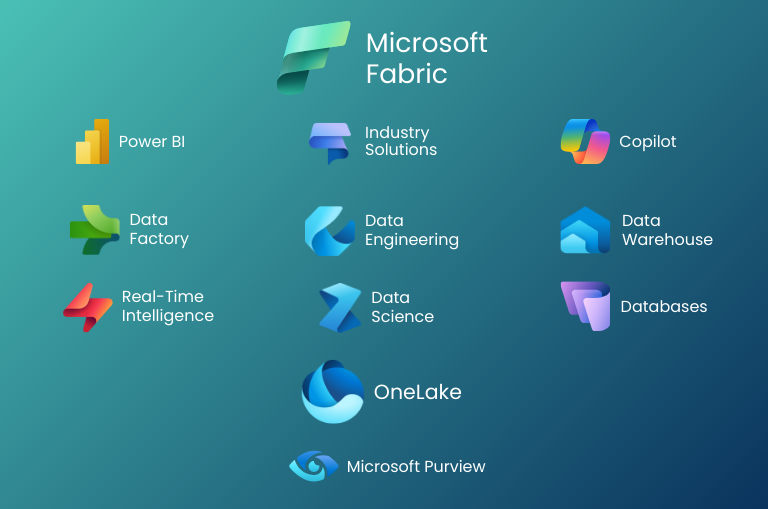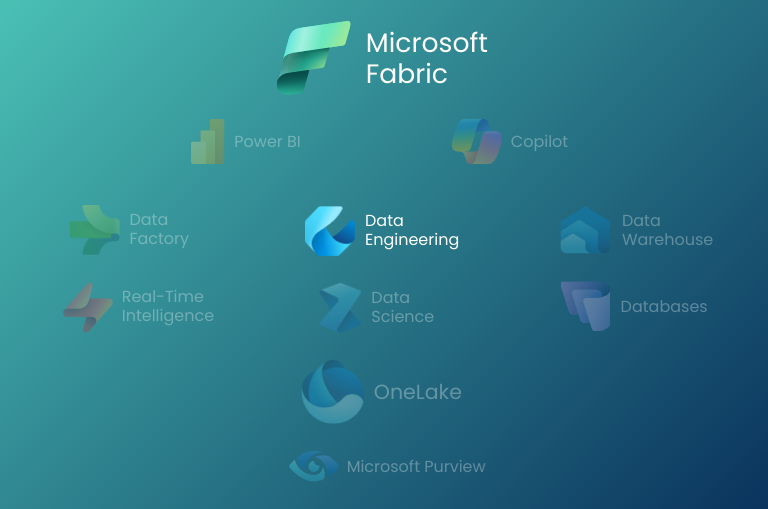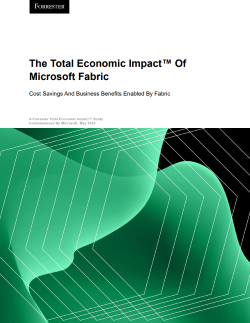What is Data Engineering in Microsoft Fabric
How to turn the potential of AI transformation into a real competitive advantage? The answer lies in effective data management, supported by the right tools and team competencies.
Effective data management enables more informed business decisions. Moreover, modern technology platforms, including Microsoft Fabric, significantly streamline this process. It is precisely through the integration of such innovative solutions that organisations gain the ability to leverage the potential of artificial intelligence fully.
In this article, we will take a closer look at how Microsoft Fabric, and in particular the Fabric Data Engineering service, support this transformation in practice.
What is Microsoft Fabric?
Microsoft Fabric is a comprehensive, integrated data and analytics platform designed for enterprises seeking a simple yet versatile solution for collecting, processing, and analysing information. The platform operates in a SaaS (Software as a Service) model, which ensures ease of use, high scalability, and security.
The key assumption of the platform is the unification of resources and services in one coherent environment. Instead of integrating solutions from different providers, Microsoft Fabric offers a unified technology stack based on Microsoft Azure cloud, which streamlines the work of both business teams and IT specialists.
Data in Microsoft Fabric is stored in OneLake, a central repository that eliminates the need to use multiple, often dispersed, data storage systems. Thanks to this, companies can manage access more efficiently, maintain data consistency, and ensure regulatory compliance.
Built-in artificial intelligence (AI) mechanisms help to understand data better and use it in Microsoft Azure AI Services and specific applications, from real-time reporting to advanced machine learning modelling available in Microsoft Azure AI Foundry.
One of the most innovative elements of the platform is Microsoft 365 Copilot, an integral part of Fabric. Copilot is an assistant based on generative artificial intelligence (GenAI), which automates routine tasks, fills gaps in expertise, and suggests optimal operations on data. As a result, users can create reports faster, formulate queries, and implement data engineering processes without the need to write complex scripts.
Moreover, Copilot analyses the context of data and adapts suggestions to specific business needs. As a result, organisations using Microsoft Fabric, supported by Microsoft Copilot, gain an integrated environment for efficiently combining data from various sources, such as Microsoft Dynamics 365 Sales, designing advanced analytical pipelines, and using machine learning algorithms, as well as ready-made large (LLM) and small models (SLM) in daily work.
This coherent platform significantly reduces administrative costs, accelerates the implementation of new projects in Power Platform and Microsoft Copilot Studio, and effectively supports teams at every level in maximising the potential of information.
What applications are included in Microsoft Fabric?
Microsoft Fabric is a suite of services with broad applications across the entire data processing and analysis cycle. It offers a unified platform in which each component plays a key role in the ecosystem.

Thanks to this, companies gain versatile tools for migration, management, and data analysis as well as for creating innovative AI solutions.
- Fabric Data Factory - This is a modern tool for integrating and preparing data from various sources. It allows the automation of ETL/ELT processes, task scheduling, and fast transfer of even gigantic volumes of information to target data warehouses. In addition to a rich library of connectors, Data Factory provides mechanisms functional in AI transformation, such as built-in support for intelligent data flows. Thanks to its simple interface, both experienced programmers and business specialists can quickly create data pipelines without the need to write complicated scripts.
- Fabric Data Engineering - A module created for teams specialising in advanced calculations and data engineering. It offers a Spark cluster-based environment, enabling fast processing of massive datasets and integration with other Fabric components. This fosters the creation of scalable machine learning projects, supported by configurable tools and libraries.
- Fabric Data Warehouse - A high-performance data warehouse designed with scalability and flexibility in mind. It allows the separation of computing resources from storage, enabling users to manage performance and costs independently. It supports the native Delta Lake format and integrates seamlessly with other services.
- Fabric Databases - Facilitate the management of relational and custom data structures in a centralised environment. They allow quick replication of data from various sources and consistent scaling for transactional and analytical applications.
- Fabric Data Science - A module that simplifies the design, training, and deployment of machine learning models. It supports integration with Azure Machine Learning and provides a set of tools that facilitate experiments and model lifecycle management.
- Fabric Real-time Intelligence - Provides instant collection and processing of streaming data, enabling real-time event monitoring and log analysis. This allows companies to respond quickly to dynamically changing business conditions based on current data.
- Fabric Power BI - A well-known and valued tool for visualisation and interactive data analysis. In the Fabric environment, it provides easy access to all resources in OneLake, speeding up the creation of reports and dashboards.
- Copilot in Fabric - Copilot is an AI assistant that supports users in automating tasks related to data transformation, cleaning, and modelling. Its ability to generate suggestions and code significantly accelerates the implementation of new analytical processes and learning how to use the platform.
- Fabric OneLake - A central data repository where all files and tables are collected. Thanks to consistent storage, information can be easily shared across different Fabric moduless and data duplication can be avoided.
- Microsoft Purview - A comprehensive solution for data governance and security. It allows monitoring the flow of information within Fabric and establishing governance and compliance policies.
- Fabric Industry Solutions - Provides dedicated industry-specific data solutions that form a solid foundation for data management, analysis, and key decision-making. These solutions address the specific challenges of different sectors, enabling companies to optimise processes, combine data from many sources, and use advanced analytical tools.
Microsoft Fabric combines all these areas into a unified data platform, offering the most comprehensive platform for big data analysis in the entire industry. Fabric enables organisations and individuals to transform large and complex data repositories into practical working solutions and business analyses.
The future and market of tools supporting data systems based on lakehouse architecture
The lakehouse architecture, combining the flexibility of data lakes with the functions of warehouses, is becoming the foundation of modern analytical platforms. Tools for designing, building, and maintaining such systems focus on data integration, security, and handling advanced AI workloads, which translates into dynamic market growth.
Modern tools offer:
- Automation of metadata management, enabling data lineage tracking and versioning.
- Support for ACID transactions, ensuring data consistency in distributed environments.
- Integration with AI/ML engines.
- Real-time stream processing for applications in finance or logistics.
Market statistics
- The lakehouse market will grow from USD 8.5 billion in 2024 to USD 22.97 billion by 2029, with a CAGR of 21.9%.
- 60% of organisations prefer cloud lakehouse deployments due to scalability and reduced infrastructure costs.
- 85% of lakehouse users use this architecture to develop AI models, and another 11% plan implementations in this area.
- 41% of companies are migrating from cloud data warehouses to lakehouses to combine business analytics with big data processing.
- Real-time processing is a priority for 60% of enterprises in sectors such as finance or healthcare.
Despite the advantages, the key challenge remains data quality management. According to research available on arXiv, the average time to detect a breach is 189.8 days. The solution is tools for automatic data cleaning and anomaly detection based on machine learning. The evolution of the market will be associated with hybrid architectures combining public cloud with edge infrastructure.
What is Fabric Data Engineering
Fabric Data Engineering is a key component of Microsoft Fabric that enables the design, construction, and maintenance of infrastructure and systems for collecting, storing, processing, and analysing large amounts of data. Thanks to it, organisations can effectively manage their data resources, ensuring their availability, organisation, and high quality.

One of the main functionalities of Fabric Data Engineering is the ability to create and manage lakehouses, which combine the advantages of traditional data warehouses with the flexibility of data lakes. Users can design data pipelines that automate the processes of collecting and processing data, which allows faster data preparation for analysis. Integration with Apache Spark enables batch and streaming jobs, which are essential in the context of real-time data analysis.
The solution also offers interactive notebooks that allow writing and executing code in various programming languages such as Python, R, or Scala. Thanks to this, analysts and data scientists can easily carry out data ingestion, preparation, and transformation processes. These tools also support advanced artificial intelligence techniques, enabling the creation and deployment of machine learning models without leaving the Fabric platform.
Fabric Data Engineering integrates with Azure AI Services, enabling the automationof data analysis processes and thee generationof predictions and recommendations based on collected information. Thanks to this, companies can quickly respond to changing market conditions, optimise their operations, and implement innovative business solutions. The platform also provides tools for monitoring and managing AI models, which increases their effectiveness and reliability.
Additionally, Fabric Data Engineering supports data quality management through automatic anomaly detection and regulatory compliance. This ensures that organisations can be confident that their data is not only available but also accurate and secure. All this makes Fabric Data Engineering an invaluable tool in the AI transformation process, enabling companies to fully utilise the potential of data.
Who is Fabric Data Engineering for?
Fabric Data Engineering is dedicated to engineering teams, data analysts, and data scientists.
It is ideally suited for organisations that need scalable solutions for managing large datasets and integrating analytical and AI processes.
Regardless of the industry, this tool supports professionals in the efficient processing and analysis of data.
How to use Fabric Data Engineering in business?
Fabric Data Engineering can be used in many ways, supporting various aspects of business activity:
- Automation of data processes: Facilitates the collection, processing, and analysis of data without the need for manual management.
- Optimisation of operations: Through advanced data analysis, companies can identify areas for improvement.
- Decision support: Srovides accurate and up-to-date information that helps in making strategic decisions.
What are the benefits of using Fabric Data Engineering?
Using Fabric Data Engineering brings many benefits, including:
- Scalability: The ability to adjust resources to growing data needs.
- Integration: Consistent connection of various tools and services within one platform.
- Efficiency: Automation of data processes saves time and resources.
- Data quality: Advanced data quality management tools ensure accuracy and consistency.
What are the benefits of using Fabric Data Engineering in a company’s AI transformation?
Using Fabric Data Engineering in a company’s AI transformation offers the following benefits:
- Acceleration of AI: Implementation and Faster preparation of data for training models. Higher data quality translates into more accurate AI models.
- Process optimisation: Automating data processing increases operational efficiency.
- Flexibility: Easy scaling and adapting AI solutions to company needs.
How does Data Engineering integrate with other Microsoft Fabric modules?
Fabric Data Engineering integrates seamlessly with other Microsoft Fabric modules, creating a coherent data ecosystem. Data processed in Data Engineering can be easily shared in Fabric DatWarehouse, analyseded in Power BI, or used by AI tools such as Microsoft 365 Copilot.
Integration with OneLake ensures centralised data storage, enabling easy access and management across the organisation. Thanks to this, different teams can collaborate more effectively using unified and up-to-date data.
Return on investment from implementing the unified Microsoft Fabric data platform
 The Forrester report The Total Economic Impact™ Of Microsoft Fabric (TEI) shows that Microsoft Fabric provides a 379% return on investment (ROI) over three years with USD 9.79 million NPV. Analysing a company with revenues of USD 5 billion, Fabric increased the productivity of data engineers by 25% (USD 1.8 million savings), increased the efficiency of business analysts by 20% (USD 4.8 million savings), and generated USD 3.6 million in gains thanks to better decisions.
The Forrester report The Total Economic Impact™ Of Microsoft Fabric (TEI) shows that Microsoft Fabric provides a 379% return on investment (ROI) over three years with USD 9.79 million NPV. Analysing a company with revenues of USD 5 billion, Fabric increased the productivity of data engineers by 25% (USD 1.8 million savings), increased the efficiency of business analysts by 20% (USD 4.8 million savings), and generated USD 3.6 million in gains thanks to better decisions.
Infrastructure savings reached USD 779,000, and employee retention improved by 8%. The unified platform integrates data engineering, warehousing, science, and real-time analysis, eliminating silos. The SaaS model and intuitive interface enable data availability across the organisation, supporting data-driven strategies, according to the Forrester TEI study commissioned by Microsoft.
Summary
Microsoft Fabric Data Engineering is a powerful tool leveraging Microsoft Copilot that supports companies in managing data at every stage of its processing.
Implementing Microsoft Fabric with Data Engineering, along with the implementation of Microsoft Power BI and Microsoft 365 Copilot, creates an integrated data and AI ecosystem. Fabric Data Engineering centralises and prepares data at scale, building a foundation for analytics.
Power BI transforms this data into interactive visualisations and accessible reports, enabling quick insights. Microsoft 365 Copilot, operating within office applications, increases productivity by using the organisation’s data (in a secure way) to assist in content creation and analysis. Together, these tools streamline the flow from data to decisions, democratize access to advanced analytics and AI, and increase operational efficiency.
Thanks to integration with other platform modules, it allows full utilisation of data potential in AI transformation. Scalability, automation, and high data quality are the key benefits that translate into better operational efficiency and competitiveness in the market. By choosing Microsoft Fabric, organisations invest in a future where data is the foundation of business success.

